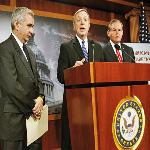20 November 2009

Photo: AP
Senate Majority Whip Richard Durbin of Ill., (C), Sen. Jack Reed, D-R.I., (L), and Sen. Robert Menendez, D-N.J., during health care reform news conference on Capitol Hill, Washington, 20 Nov 2009
The U.S. Senate is scheduled to take a crucial vote on Saturday on legislation crafted by majority Democrats to reform the U.S. health care system. Democrats, facing expected unanimous opposition from Republicans in the chamber, need to ensure that all 60 of their members vote in favor of moving ahead to a full debate on the measure.
Democratic Majority leader Harry Reid has set the vote for eight o'clock Saturday evening.
Though only a procedural step, it is a crucial test of Democrat's ability to ensure 60 votes required to overcome obstacles to moving the legislation ahead.
Senators engaged in a day-long debate on Friday ahead of the Saturday vote.
Ohio Democrat Sherrod Brown said the bill would inject needed competition into the health insurance market, providing Americans with an alternative to private companies that have made huge profits while excluding persons with pre-existing medical conditions:
"Insurance company profits have gone up 400 percent over the last 7 years because the insurance companies denied care for so many people so they can't get insurance, and then they turn down so many claims. Thirty percent of insurance company claims are turned down initially by the insurer," said Brown.
Republicans continued to attack the more than 2,000 page bill as a huge enlargement of the existing government health care bureaucracy, asserting it would force millions of Americans to pay higher insurance costs.
Though the bipartisan Congressional Budget Office (CBO) estimated the cost of the legislation at just under $850 billion, Republicans maintain that its actual cost will be $2.5 trillion over 10 years.
Mitch McConnell is the Senate Republican leader:
"Once everything kicks in, if you look at a 10 year window after everything kicks in, this monstrous 2,074 page bill would actually cost $2.5 trillion. A massive, massive expansion of the federal government," he said.
The Senate bill would create a government-offered insurance option to compete with private insurance companies, and extend insurance coverage to 31 million Americans, pushing the national coverage rate for legal U.S. residents to about 94 percent.
That compares to a 96 percent estimate for legislation the House of Representatives approved two weeks ago, which like the Senate bill would rely on new taxes on wealthier Americans, and about $400 billion in savings from the government-run Medicare program.
Two western state senators, Wyoming Republican Mike Enzi and Patty Murray from Washington state, made opposing points about the economic impacts of the legislation:
ENZI: "The bill would reduce wages and eliminate the jobs of millions of Americans. It would actually drive up health insurance premiums for many more Americans and still leave 24 million people without insurance coverage. We need to do better than that.
MURRAY: "If we let another year go by without reform, more and more families are going to lose their coverage and more and more businesses are going to collapse under the growing burden of the cost of health insurance."
Republicans dropped a threat to block the Saturday procedural vote by demanding that the entire 2,000 page bill be read on the Senate floor.
Three centrist Democrats, Nebraska Senator Ben Nelson, Mary Landrieu of Louisiana and Arkansas Democrat Blanche Lincoln have voiced concerns about aspects of the measure, but were expected to vote yes on the motion to proceed.
Independent Senator Joe Lieberman is expected to vote with Democrats to clear the bill for debate, but has threatened to side with Republicans to block a final vote still weeks away.
If Democrats get their 60 votes on Saturday, lawmakers could leave town claiming a key procedural victory, to return after the Thanksgiving holiday to begin the difficult process of amending the legislation, expected to last through much of December.
If the Senate approves a bill next month, Senate and House lawmakers would still have to negotiate a final bill both chambers would then have to approve, before President Barack Obama could sign legislation.
After a number of missed deadlines in recent months, the president has said he hopes to have a bill on his desk before his State of the Union Address in January.